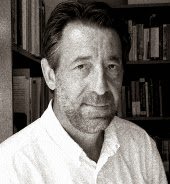On Poetry
I just returned from the Calvin Festival of Faith andWriting. This time around, I enjoyed the company of four people—two students, a formerstudent, and a fellow editor. I stayed with the latter two at abed-and-breakfast in Grand Rapids, while the students stayed with a hostfamily.
The parking lots at Calvin College, where the event tookplace, were lined with banks of still-meltingsnow. The locals seemed ready for warmer weather, some of which we wereblessed to enjoy.
My friends all arrived on Wednesday (it started Thursdaymorning), but I had to teach till 9:30 P.M. Wednesday night, so I took the earliest flight out the next morning. When I arrived at the Dallas airport, I ran into another formerstudent headed Calvin way. The festival provided the option of submitting amanuscript for review, and she told me she’d landed an appointment. (On the way back we ended up on the same flight again, and she told me the publisher wants her first book!)
 Poet Scott Cairns (@ScottCairnsPoet) spoke at the firstsession I attended. His topic: “Writing as a Way of Knowing.” His poetry and essays have appeared in Poetry,Image, and The Atlantic, and his most recent book is IdiotPsalms: New Poems. He read from some of his brilliant work. I'm not big on poetry, but I loved his stuff.
Poet Scott Cairns (@ScottCairnsPoet) spoke at the firstsession I attended. His topic: “Writing as a Way of Knowing.” His poetry and essays have appeared in Poetry,Image, and The Atlantic, and his most recent book is IdiotPsalms: New Poems. He read from some of his brilliant work. I'm not big on poetry, but I loved his stuff. Some takeaways:
In approaching scripture, rabbis have often sought out thedark sayings, the difficult places, searching for truth rather than going afterthe happy, motivational texts. Verses that have failed to fit their scheme,they’ve pursued in order to have their “scheme” corrected. These scholars poreover a difficult text, pray over it, and come up with a way to grapple with it.
In Luke 22:44, we read that Jesus in Gethsemane “prayedmore earnestly.” Cairns asked what our Lord was doing before he got earnest?These little “oddnesses in the text,” as he described them, can provide “muchfodder for pondering.” After making this observation, he read us his work, “TheMore Earnest Prayer of Christ,” in which he said the divine in Christ contractedto an ache. In “Threnody,” a term for apoem/psalm for the dead, Cairns imagined his deceased father appearing. The comment I wrote in my notebook about it was simply “Wow.”
I must get a copy of St. Isaac of Syria/Nineveh’s Homilies. Dostoevsky had a copy, and in The Brothers K Father Zosima’s beloved characterdelivers lines straight out of St. Isaac.
Cairns’s favorite poets are St. Simeon the Theologian, W.H. Auden, Coleridge, St. Isaac, Robert Frost, Emily Dickinson, and ElizaBishop. He exalted Frost for lines that say more than one thing: “Even thesyntax shifts when you change lines. What I think is an adjective isn’t one onthe next line.”
About poetry: A poem is that through which we gain aglimpse, but not a conclusive one. That’s why we can read again and acquiremore. We aren’t even fully aware of ourselves. The thing about the endless life(theos) is that we’ll be made holy. “Mostly I’m excited about that,” he said. “He is endless in capacity... He will always exceed us.”
When someone asked, “Is there a point at which thelanguage becomes opaque, too dense, putting the burden entirely on the readerto ascertain meaning?” he said, “That’s what we’d call bad writing. Poems arenot coded messages. The goal is not to crack the code... I want a poem to be a scene of meaning-making... Have your best friendread it. If it makes no sense to that friend, that’s bad.” Poems should makesense.
Stay tuned for more stuff from the conference.
